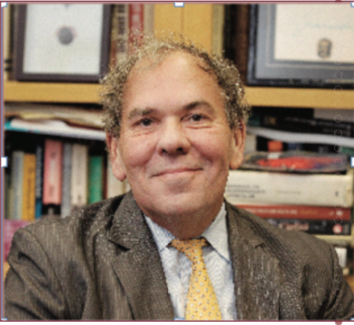Educational Visionary Arthur Levine Visits Scarsdale
- Category: Schools
- Published: Wednesday, 06 March 2019 11:28
- Joanne Wallenstein
 According to Dr. Arthur Levine, the United States is in the throes of profound change –- that is impacting the way we work and live – and is having far-reaching effects on how we educate our children.
According to Dr. Arthur Levine, the United States is in the throes of profound change –- that is impacting the way we work and live – and is having far-reaching effects on how we educate our children.
Invited to Scarsdale by Dara Gruenberg, Dr. Levine’s talk on Thursday, February 28 was jointly sponsored by the Scarsdale Forum, the Scarsdale PT Council, the Scarsdale High School PTA and the Scarsdale Library. As Gruenberg said, “We are best as a community when we work together.”
Dr. Levine is a recognized expert in the field of education. He is the sixth president of the Woodrow Wilson Foundation and is a former president and professor of education at Teachers College, Columbia University. He is the author of many books, articles, and reviews, which often appear in The New York Times and The Wall Street Journal. He has received 25 honorary degrees, Carnegie, Guggenheim, and Rockefeller Fellowships, and the Educational Press Association’s Annual Award for writing three times and is also a member of the American Academy of Arts and Sciences.
Levine outlined three major forces that are driving change in the education landscape: the economy, technology and demographics.
He explained that the US has gone from an economy focused on the production and distribution of material goods to a digital information economy powered by minds and knowledge. This shift has caused the loss of jobs in fields like mining and construction in exchange for jobs in information technology and has resulted in struggling cities in the rust belt and booming development in places like Silicon Valley, Austin and Seattle.
Advances in technology have also had profound effects on the job market with many jobs requiring a college degree and some an advanced degree. Students need higher-level skills to compete in today’s economy as many unskilled workers are being replaced by automation which has proven to be more consistent, flexible, reliable and efficient that human workers. Levine predicted that jobs such as cashiers, clerical workers and administrative assistants would be replaced with automation – and even doctors, lawyers and journalists could find that computers could outperform them.
What does this mean for education?
Levine said in this new paradigm, “Digital natives are being taught by digital immigrants,” and the two groups operate in different fashions. He highlighted the differences between how traditional schools work and how students in the digital age learn:
For example:
-While our schools operate on fixed time schedules, the kids who attend operate 24/7.
-While schools are location-bound, kids today learn anytime and in any place.
-Programming in class is determined by the teacher and the school, while today’s kids are educational consumers who seek out their own learning materials and media.
-While education is abstract, today’s generation are concrete learners.
-While schools generally use analog media, kids use digital media.
-While today’s schools focus on individuals, kids today are collaborative and group oriented.
-While school curriculums focus on depth our kids are focused on breadth.
Furthermore, Levine explained how the technological revolution is impacting education as we know it. Big data, artificial intelligence and virtual reality will change the way kids learn and what they will need to learn.
Virtual Reality
He predicted that for many, traditional college classes will be replaced with online learning experiences that utilize virtual reality to create personalized learning experiences without attendance on a college campus. In fact, due to high demand for admittance to college, the state of California has created a virtual community college to accommodate all the people they can’t take into their system. The virtual college will offer courses in job skills and retraining, granting those who complete the programs certificates or badges – but not college diplomas.
The availability of customized digital media will replace the need for printed textbooks allowing kids to learn at their own pace. Levine conjectured that individualized learning would mean the end of uniform course lengths and traditional measures of success, with students rewarded for competency in a certain discipline rather than completion of a prescribed curriculum.
Demographics
The changing demographics of the countries population are already impacting the market for education. People coming into the country from abroad will cause the white population to drop and by 2025 whites will be in the minority.
The fastest growing groups of students are those with which our system has been least successful and the country will need to find economical ways to educate them. Levine said that some states are already moving toward providing the first two years of college for free as the value of a high school education decreases.
This population shift will also cause the closure of small liberal arts colleges as there will not be enough students with the means to pay the tuition. In turn, access to remaining top tier schools will continue to shrink as demand grows.
What kinds of education and skills will kids needs to succeed? Many of these competencies are already built into the Scarsdale curriculum. Levine predicted that students will require training in critical thinking, problem solving and fact detecting and will need to be collaborative, communicative, creative and flexible. They should be literate as well as adept at using technology. He also called for students to be citizens of the world, and to learn about global economics, politics, religion and cultures.
He ended by posing a question that’s on the minds of many Scarsdale parents who grew up in a different era … Should students pursue a liberal arts education or seek professional skills in college?
Levine said that though students with professional or technical skills earn higher starting salaries, those who augment a liberal arts education with an internship or additional training also thrive.
Listening to Dr. Levine, one quickly realizes that the future is now – and we are already living through the changes he sees in his crystal ball. With Scarsdale’s emphasis on critical thinking and problem solving and its adaptation of STEAM at every grade level, the district is already preparing students for this brave new world.
Commenting on Levine's remarks, Edgar McIntosh, Assistant Superintendent of Curriculum, Instruction and Assessment at the Scarsdale Schools said, "It was exciting to hear Arthur Levine speak last week. I've long admired his emphasis on creative and critical thinking and the importance of providing authentic and meaningful learning experiences for students. I was also reassured in many ways. Scarsdale is a learning environment that is dedicated to making structural and instructional changes to meet the evolving educational needs of our students. This is illustrated nicely by the recent work the district has embarked in design thinking, STEAM, and social entrepreneurship."
Watch the talk in its entirety here:













